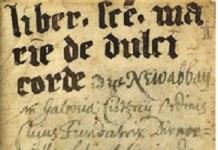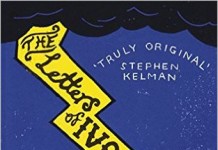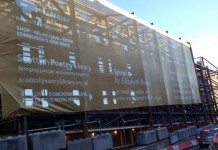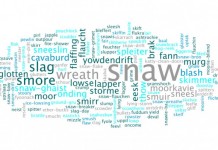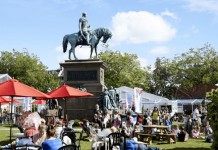 At the Edinburgh International Book Festival 2014, I spoke to Sarah Morrison, Communications Executive of the Edinburgh UNESCO City of Literature Trust, about how Edinburgh pioneered the UNESCO Cities of Literature programme, and what this has done for the city itself.
At the Edinburgh International Book Festival 2014, I spoke to Sarah Morrison, Communications Executive of the Edinburgh UNESCO City of Literature Trust, about how Edinburgh pioneered the UNESCO Cities of Literature programme, and what this has done for the city itself.
Sarah Morrison: In 2004, four book lovers, including the previous director of the director of the Edinburgh International Book Festival, got together, and we were tossing up everything that is about literature in Edinburgh, and came to the conclusion that this was a city of literature and that should be recognized. So we very quickly came together with the idea of going to UNESCO, with this massive body of evidence, and saying we think we should be officially recognized as a city of literature. I don’t think anyone was expecting it to happen so quickly: it just went through first time. Everyone loved the idea. So in October 2004, Edinburgh became the world’s first UNESCO City of Literature.
TeleRead: So the idea essentially came from Edinburgh rather than UNESCO?
Sarah Morrison: Absolutely. They took the information there, the evidence of the books, the writers, the publishers, the festivals, the events, everything that goes into a city of literature, to UNESCO. That has now grown to seven Cities of Literature, and we expect more to come along towards the end of this year. As well as the first UNESCO City of Literature, Edinburgh was also the founding city of the Creative Cities Network, which now has grown to 40 right around the world: art, astronomy, media arts, folk arts, anything that you can think of that you would find to be creative in a city.
TeleRead: How do you work with the other Cities of Literature, especially around Festival time?
Sarah Morrison: With the other Cities of Literature, we try to meet up online as often as we can – Skype, Hangouts – to talk about what’s happening and our plans, and we share that information by email as well. And we talk about how the Cities Network is developing. There is also annually a the conference which is going to be in China, and that is all the creative cities together, talking within their own creative network and deciding how the network can grow, develop, go forward, attract new people into it. They also very much encourage people who would like their city to be a City of Literature to come to that, to get in touch with cities, to talk to them, and see how to take that forward, and any advice we can give, we’re very happy to do that. It’s mostly Ali, the Director: she has been through the whole process, and has helped develop the process, with UNESCO, to make it much easier for people to put together a case for a city to become a City of Literature. This Book Festival, we work with Krakow, a sister City of Literature, and we will also be going with a delegation from Edinburgh to the Conrad Festival in Krakow at the end of October.
TeleRead: What has the City of Literature programme done for Edinburgh, within Edinburgh, and what recognition does it get from the cultural community and the city as a whole, including the tourist development offices?
Sarah Morrison: It’s really given people within the literary community a sense of community, something to show I’m not alone and shouting to the world, but part of something bigger. And that is really encouraging. You can benchmark, you can collaborate, run ideas past people, it really is invaluable for that. The Trust runs a monthly salon in Edinburgh which is free to attend for anybody with a professional interest in books and ideas, and that attracts everyone from novelists, poets, screenwriters, publishers, booksellers, you name it. Being a one point, a one-stop-shop has been a real help. We really encourage emerging writers to be part of that community and to take up every opportunity to do things within it and share experiences.
As a trust, we really see ourselves as a development agency, to help other people do things and bring words to the street themselves and persuading people to do it themselves, as opposed to waiting for others to do it. That’s more valuable, and allows a much wider community to become involved in projects. We’re a cultural development agency. And if people would like support, development advice, we try to bring things together. The oversight we have is to help the Trust in its work: this is about Edinburgh as a City of Literature.
TeleRead: What sort of result has that had in tourism and also for the broader Edinburgh profile and Visit Scotland tourism efforts?
Sarah Morrison: We work very closely with Visit Scotland. They’re always keen to work with us in any way, shape or form they can. We have a board representation on their Council, which is kind of a think tank. We’re very close to people within the tourism community, so we can share information. It’s very difficult to find a day or night in Edinburgh when there isn’t something happening in a literary way. We want that to be for tourists as well as residents. There are so many things you can do for free.
Today we launched an Innovation Fund with the Edinburgh Tourism Action Group, and that is a way for businesses within tourism in Edinburgh to create brand new experiences for people visiting a city with a very strong literary atmosphere, to maximize the assets they have around them. People are increasingly aware of that with Edinburgh as a City of Literature, and to use it within their business. We can offer support, advice, and there’s a seed fund you can access if you want to create something entirely new. It can be something as simple as a romantic weekend which starts with having a poem read for you at your hotel by a Makar, something as daft and simple as that, but you do make the most of what’s around you, and you will see it coming back. That’s the holy grail of literature attractions.
TeleRead: Is there any impact of the independence debate in any aspect whatsoever in the work of the programme?
Sarah Morrison: What we’ve seen is what everyone else has seen: There’s been an increase in events, including in the Festival, to talk about what’s been happening, what could happen, and if it’s making people think, read, talk to writers, that’s absolutely brilliant and we encourage that. We just want people to read and think about the wider aspects of literature within Edinburgh.


















